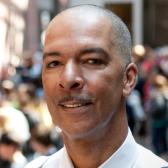DAVID REYNOLDS:
I have a thing about victimization, where during the Holocaust a lot of people were victimized. You have the situation down in the Darfur region of the Sudan; also back to slavery. So, it's not just guarding the Holocaust Museum. Anytime it's a situation where you have victims, in the broader spectrum, it encompasses everyone.
ALEISA FISHMAN:
One year ago this month, Officer Stephen Tyrone Johns died heroically in the line of duty, protecting visitors and staff at the US Holocaust Memorial Museum from an avowed antisemite, Holocaust denier, and racist. Special Police Officer David Reynolds worked alongside Officer Johns. Reynolds continues to welcome and protect people at the Museum as he has for over a decade. Reynolds feels his role is important because of the antisemitism, racism, and bigotry that still exist in the world.
Welcome to Voices on Antisemitism, a podcast series from the United States Holocaust Memorial Museum made possible by generous support from the Oliver and Elizabeth Stanton Foundation. I'm Aleisa Fishman. Every month, we invite a guest to reflect about the many ways that antisemitism and hatred influence our world today. From Washington DC, here's Officer David Reynolds.
DAVID REYNOLDS:
Yes, my name is David Reynolds. I've worked here at the Museum for approximately 13 years. I'm responsible for the safety of the employees and visitors. I try to make sure that the officers here at the Museum, and supervisors, are as prepared as possible, just in case we have to respond to emergencies. We're the first contact, and the impression that we leave is important, very important. And that's basically what I do.
I had worked a number of other jobs before. I used to drive a taxicab; I used to work in the moving business. I've always enjoyed working with the public. So I decided to take a look and see what was involved in working here at the Museum. I see it as a tremendous responsibility, because you have a number of people that come to the Museum, not only to work, but to visit, and at any moment a crisis can occur and people that don't know you depend on you.
It's important to me, when you see the young visitors that go through the Museum, the look on their faces and the tears wiped away, because they can relate. And being an African-American male, I've dealt with a number of situations where my color came into question. And I can also relate to a certain extent, because my ancestors went through a lot. There's a correlation there. There's a bond there. And for me, personally, the facility is a symbol, knowing that there are factions throughout the world that do not want this place to exist. And it's important to remember that.
ALEISA FISHMAN:
Voices on Antisemitism is a podcast series of the United States Holocaust Memorial Museum. Join us every month to hear a new perspective on the continuing threat of antisemitism in our world today. We would appreciate your feedback on this series. Please visit our Web site, www.ushmm.org.

